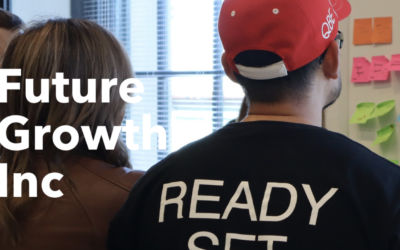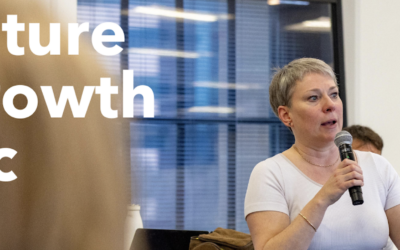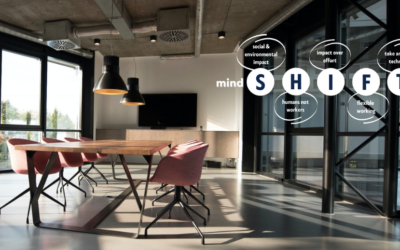In this episode of the Disrupt Podcast, Gavin is joined by John Dobbin, entrepreneur and digital transformation consultant. They talk about the way transformation has, itself transformed, and what’s coming next – from nanobots to an abundance of leisure.

John Dobbin
Digital Transformation Consultant
I help organisations use the latest technology to drive change, and coach teams to be more collaborative and innovative.
I work at either the strategic level, helping to craft strategy and develop initiatives; or at the execution level, helping with analysis, design and delivery.

Gavin Heaton
Founder Disruptor's Handbook
Gavin is a marketing technologist, strategist and advisor. He is the founder of the Disruptor’s Handbook – a strategy and innovation firm that brings the best of startup approaches to the enterprise.
Transcript:
Gavin: [00:00:00] So welcome. John Dobbin to the Disrupt podcast and maybe you could start by giving us a quick introduction to you and your life’s work.
John: [00:00:09] Hi Gavin. So currently I’m doing digital transformation consulting so I go into organisations and I help them become more digital and less analogue. Prior to that I founded and ran a business for about 17 years in a very high end systems integration work in the media and advertising space. Prior to that I was caught up in the postscript revolution where we were putting everyone in Macintoshes and getting rid of art drawing boards. Prior to that I was sort of getting off the ark with Noah really.
Gavin: [00:00:45] Was there much need for digital transformation on the arc?
John: [00:00:49] Yeah look the it was the early run of CRISPR really because they had just a very few little species but somehow they crammed all those species into a tiny into a tiny ark and here it is. So yeah the secret was CRISPR and better right back then.
Gavin: [00:01:06] So you’ve seen a lot of transformation in the industry that you work in right – so media …
John: [00:01:10] You know we call it transformation now. Prior to that we used to call it process reengineering. Prior to that we used to call it technology. So I did a talk the other day am I going on about what is digital transformation. And I pulled up a slide from 1963 I think it was 1963 or 1964 and it was an image of this huge computer bank that took up the whole floor of what is now a hotel. And it was was Westpac Bank’s which was their core Bank West I think – and it was their first computer and what it was going to do was going to revolutionise transactions. And if you read the press release it’s exactly like the press releases that you see today about efficiencies and blah blah blah blah blah. So nothing’s changed except the language and probably the speed. So things are happening much faster now in terms of technology than they did you know 15, 20, 30 years ago.
Gavin: [00:02:07] So what is the thing that makes you most interested in this transformation space because obviously you’ve got a passion for it and you’ve been following it for some time so what is it that’s drawing you in and saying John, come see me.
John: [00:02:20] Yeah yeah. I was interviewed the other day by some students and they said what got you into technology? Because it started with technology and I hadn’t thought about that. And I cast my mind back to when I was in high school and I’d got this programmable calculator and it was an HP and I still got it. I still got damn thing as a memento. And what I loved about it is that – and I was studying maths – and what I could do is I put in all of these equations I could program the equations. And what that meant is that if I do my my homework on exam I didn’t have to write out lines and lines and lines of formulas where you could make a mistake. I could just punch in these routines and I could finish my homework or finish my exam and off to the beach. So fundamentally it was about using the machines to do the drudge work and then that went into the micro computer revolution and all of the rest of us history. But basically what I what I saw was technology is the ability to remove the human from grunt work and so we could do better things. Now, do we do the better things? Maybe – maybe not. But that was the original driver.
Gavin: [00:03:36] So does that mean we’re just getting lazier or is that we’re getting smarter?
John: [00:03:44] I think laziness is a good thing. You know if you – I some time in Central Australia and studying Aboriginal culture and they had a pretty good life – spend a few hours getting all of the resources that you needed to live and then the rest of the time playing and and doing art on the side. I think laziness is a bit of a driver. I think that it’s a fundamental human need to be lazy. So yeah and then we get caught up in this whole Protestant work ethic and we use our tools and we work harder and harder and harder. So we – I don’t think were very smart with the use utilisation of technology. I think we should be you know we should be using it to create much more leisure.
Gavin: [00:04:27] I love it that thought. So we’re working harder to get where ideally getting – supposed to be working harder or getting working smarter to get faster. But we’re working harder to get slower or … more intense.
John: [00:04:41] I think we work harder to work harder. So do we live for work or do we work to live?
Gavin: [00:04:49] More big questions.
John: [00:04:50] So this whole digital transformation thing – you know my ideal utopian world is that we do release ourselves from drudgery and we do create a culture that’s more creative more interesting, we do more interesting things. We just had a lovely coffee with people with your coffee club and that’s fantastic – that’s high evolution. We have an interesting conversations and we do that because we can afford to. And part of the reason we can afford to is the technology is doing the work for us. So on that ark it’s good.
John: [00:05:25] On the other side of things is pretty soon the robots are going to be doing all the work and we’re not going to have any money at all -which is a whole different conversation.
Gavin: [00:05:33] So in the world of digital transformation, do you find that there’s a challenge to talk about what digital transformation is or for organisations to cope with digital transformation or is it just something that is happening anyway? Is there an education process? Is it a movement? Is it change that’s happening? Is it external internal? How do you think that plays out for people and organisations?
John: [00:05:57] Yeah, so it depends. Some organisations really get it they understand exactly what Digital Transformation is about and they’ll do a Google search of my name will come up and they give me a call and off you go.
[00:06:10] Others are what is this is – this marketing? And you need to sit down and explain what it is. So my working definition is it’s the use of technology for radical organisation improvement – not just incremental but radical. So if it was Digital Incrementation, that’s what it would be called but it’s Digital Transformation so the impetus is to go in and try to radically change an organisation. So that’s kind of where I where I see it where I play.
Gavin: [00:06:40] And do you think organisations feel the need for that – is it something that comes from the internal or from their customer base from their partnerships?
John: [00:06:50] If they’re not living under a rock for the last 30 years then they would see that the market is evolving at a ever accelerating rate. So if you’re in retail, you’re very concerned about the Amazon effect. And when I say the Amazon effect I’m talking about what Amazon not necessarily Amazon on taking your business but Amazon and raising expectations of consumers so that everyone wants to be able to buy with one click. Now, that is creating competitive pressure -people retailers are seeing issues on the horizon or right now because of high tech competitors. And you can look at almost any industry you’re seeing competition like this arising. So if the organisation is smart enough they realise they have to evolve in the landscape of the market landscape which is evolving rapidly and it’s evolving because of digital technology. Therefore if you don’t become digital yourself, the likelihood of you being out-competed is very high and there’s only a few industries that are going to be quarantined from this effect.
Gavin: [00:07:56] So I like the idea of the Amazon effect not being that you’re going to be overrun by Amazon but Amazon is setting a new level of expectation for delivery and customer service.
John: [00:08:07] And that’s one competitor. Uber is doing it. You name it. Our iPhones are doing it. Everything is doing it. So our expectations are increasing every time there’s a new technology or a new cloud service for any business in town. Our expectations are going up and therefore the old businesses who don’t meet those expectations are by definition providing a less of a customer experience. And there’s a million to one start-ups all trying to outcompete them, trying to say – you know – we can provide service x for better than the incumbents because we’re more nimble – we have the technology and this is their pitch. And if you if you listen to it and you and I tend to believe it is that most large organisations are bound with their own processes and their quarterly results and they lack the innovation that lacked the agility to be able to respond to market forces. So what happens as a start-up comes up and eats their lunch and it’s happening all of the time – now to getting their lunch eaten their breakfast eaten and their dinner eaten. And so it doesn’t go there what’s next. Well we better we better start to do something. And so that’s what’s driving this change.
Gavin: [00:09:18] Great observation. So if you’re looking at a particular client or a particular industry and you see some disruption or some change happening in that industry, does it happen in the same way in other industries or are we seeing like a textbook form of disruption or are we seeing unexpected disruption?
John: [00:09:40] Well it’s unexpected. It’s highly complex. You know as we’re speaking there is this one hundred million start ups – One hundred million start ups every year. Now only 10 million of those will survive but that’s 10 million companies that are trying to do something. Now not all of those are technical technology companies – some of those might be a coffee shop or something like that – but you have this ecosystem which is exploding with people trying to find new niches and trying to find new things. So who knows where they’re for the next innovation is going to come from. Who could have expected something like Instagram suddenly appearing – it came from nowhere.
[00:10:25] So yeah there are some things that we can predict we can predict that artificial intelligence is going to automate an awful lot of repetitive jobs – we can predict that. We can predict that autonomous vehicles are going to start to have an impact in 5 or 10 years. We we can predict that smart glasses are going to change the user interface and those are going to we can predict certain things. But we’d be – it’d be naive not to be able to expect the unpredictable.
Gavin: [00:10:57] So that’s a fascinating insight John. So tell me a little bit of that out. So what you’re telling me is that the technology we can predict – but what we can’t predict is where the entrepreneurs are going to take us.
John: [00:11:11] We can’t predict where the entrepreneurs are going to take us we can’t predict the combinatorial effects of two different technologies. If you get – I don’t know – CRISPR and you know and well, it came out the other day nanotechnology and CRISPR. So what they’re doing is they’re saying rather than using viruses in order to do gene editing we’re using nanotechnology which can target the cells – which means that in a few years time or maybe more because of because of the federation and the laws – but we’ll be able to take a nano pill and it’ll be able to turn off a gene for say high cholesterol which what I’ve got – I’d have that, thank you very much. And so you know maybe maybe McDonald’s will be offering nano stents with their burgers in the future.
Gavin: [00:12:12] I’ve actually heard of business models around that as well to do with smoking where they were basically going to be building in nano repair bots into tobacco products.
John: [00:12:27] So you can you can you can have your cake and eat it too you could have your lung cancer and a nanobot to take care of. So but that’s just one example of where it’s not expected. And that’s not necessarily a threat – it’s an opportunity and a threat all at the same time. But what it does is it shows us that the world and the marketplace is changing very quickly and in unpredictable ways. Which is exciting I think.
Gavin: [00:12:54] Oh absolutely. So I was going to talk to you about value propositions but this has been a fascinating sort of detour into into digital transformation so maybe might to get you back on at some stage to talk about value props because I think that you have particular insights there as well. One thing I would like to ask and I do ask this of most of my guests is what is that.
Gavin: [00:13:21] What is that one piece of advice or what is what is that one piece of mentorship that you’ve received or insight you’ve been given over your career that changed the course of things for you?
John: [00:13:31] Yeah good, great question. It was my very first lecture – because before doing mathematics I did engineering and then I transited to mathematics because I realised that if you got the mathematics you got everything. And I was struggling with the maths so I went to maths but the engineering lecturer he said, look around the room he said most of you won’t be here at the end of the thing – most of you going to drop out or fail it’s one of the hardest degrees there is.
[00:14:01] And he says now the best advice I can give you is go home, go get your TV, take out on the footpath and smash it to bits. And to this day we haven’t had TV in our house that’s in piped TV for decades. So to me, passive – the concept of passive recreation where you sit and you you flick through channels on the lobotomy box, is a metaphor for a kind of intellectual laziness. And I think there was a great piece of advice this guy gave me – just cut out. Don’t do anything which is passive. If you’re going to spend recreation time, do it actively – read, surf, whatever. So that’s that’s my – I always thought that was a really good piece of advice.
Gavin: [00:14:53] Excellent. There you go – you heard it here – go home and smash your TVs. Thanks John. It’s been awesome. So where on the Web can we find you if we’re looking for you on the Web?
John: [00:15:04] I’m just reduced right down to LinkedIn. So John Dobbin at LinkedIn
Gavin: [00:15:10] Perfect, we’ll drop those into the show notes and thank you for your time. It’s been a fantastic conversation.
The Disrupt Podcast is for innovators who work in business, government, technology or social impact. We believe that with the right tools, approaches and inspiration you can get scale your impact and our guests have the experience and expertise to help you do just that. You can listen online or subscribe via iTunes.
How can Disruptor’s Handbook help me?

SHIFT MINDSETS
Immersive design thinking and agile methods labs to engage and inspire your team and leadership.

ACCELERATE INNOVATION
Workshops, training, entrepreneurs in residence and programs that get you to results faster.

INNOVATION TOOLS
Our tools provide the frameworks you need to get the job done without reinventing the wheel.

INNOVATION CHANGE MANAGEMENT
Comprehensive programs that bring your people and culture along on the innovation journey.



